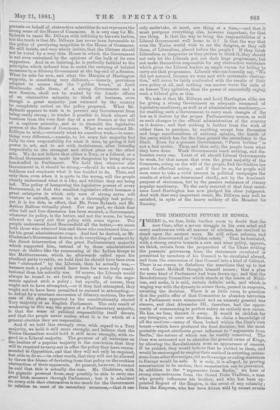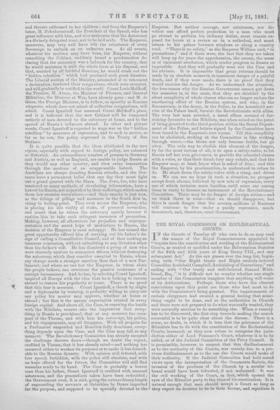THE IMMEDIATE FUTURE IN RUSSIA.
THERE is, we fear, little further room to doubt that the
new Czar, after a severe struggle in his own mind and many conferences with all manner of advisers, has resolved to stand upon the ancient ways. He will refuse reforms, and fight the discontented as " hidden rebels." That he hesitated, with a strong swerve towards a new and wiser policy, appears, we think, certain from the preparation of the Ukase settling the peasants' grievances, from the statements circulated or permitted by members of his Council to be circulated abroad, and from the conversion of that Council into a kind of Cabinet. There is no reason to disbelieve the assertions that up to last week Count Melikoff thought himself secure ; that a plan for some kind of Parliament had been drawn up ; and that the Revolutionary Committee which stands at the centre of Nihil- ism, and seeks, it is said, certain definite ends, and which is waging war with the dynasty to secure them, paused in suspense, awaiting the decision. There is as little room to question that the public offer of that Committee to abandon terrorism if a Parliament were summoned and an amnesty granted was sincere, and that Alexander III., therefore, had the oppor- tunity of commencing in perfect safety an entirely new career. He has, we fear, thrown it away. It would be childish for any foreigner, or even any Russian, to claim a knowledge of all the motives—many of them locked within the Czar's own breast—which have produced the final decision; but the most probable report attributes great influence to " arguments from Berlin," the nature of which can be readily conceived. The Czar was entreated not to abandon the general cause of Kings, by allowing the Revolutionists even an appearance of success. If he yielded, they would believe that he yielded to them, and would be encouraged to employ their method in extorting conces- sions from other Sovereigns, till no Sovereign or ruling statesman in Europe would be safe. It is only, it is alleged, by proving assassination to be useless, that assassination can be prevented. In addition to the " arguments from Berlin," we hear of strong remonstrances from the Grand Duke Vladimir, a man who greatly influences his brother, and who has been ap- pointed Regent of the Empire, in the event of any calamity; from the Empress, who has been driven wild by recent events
and threats addressed to her children ; and from the Emperor's tutor, M. Pobedonostzeff, the President of the Synod, who has great influence with him, and who maintains that the Autocracy is a divinely delegated trust, not to be laid aside. The Emperor, moreover, may very welt have felt the reluctance of every Sovereign to embark on an unknown sea. At all events, whatever his motives may have been, the Emperor, without consulting the Cabinet, suddenly issued a proclamation de- claring that the autocracy was a bulwark for the country, that he would maintain it with the whole force at his disposal, and that, assisted by all faithful Russians, he would crush out the " hidden rebellion " which had produced such great disasters. The Liberal section of the Ministry, astounded at so vehement a declaration, tendered their resignations, which were accepted, and will gradually be notified to the world. Count Loris Melikoff, the Premier, M. Abaza, the Minister of Finance, and General Miliutine, the Minister at War, have already gone ; and M. de Giers, the Foreign Minister, is to follow, as speedily as Russian etiquette, which does not admit of collective resignations, will admit. Count Ignatieff has assumed Count Melikoff's place, and it is believed that the new Cabinet will be composed entirely of men devoted to the autocracy at home, and to the spread of Russia's influence abroad. In other and plainer words, Count Ignatieff is expected to wage war on the " hidden rebellion " by measures of repression, and to seek to revive, so
• far as he can, the policy expressed in the Treaty of San Stefano.
It is quite possible that the. ideas attributed to the new regime, especially with regard to foreign policy, are coloured or distorted. An extraordinary number of persons in Germany and Austria, as well as England, are unable to judge Russia as they would any other country, and view every transaction through the medium of an unappeasable hatred. The Austrians are always dreading Russian attacks, and the Ger- mans have a permanent belief that one day they must fight out a grand quarrel with the Slays. The Jews, too, who have mastered so many methods of circulating information, have a hatred forRussia, not unjustified by their sufferings, which makes them her enemies everywhere,—and their enmity is just now, as the tidings of pillage and massacre in the South flow in, rising to boiling-point. They even accuse the Emperor, who is placing his life visibly at stake, of personal cowardice, and assert that he values the autocracy mainly because it enables him to take such stringent measures of precaution. 'Making, however, all allowances for prejudice and misrepre- sentation and the secret hope of misfortune to Russia, the decision of the Emperor is most unhappy. He has missed the great opportunity offered him of carrying out his father's de- sign of calling a Consultative Council, and of thus making an immense concession, without submitting to any dictation other than his father's will. He has dismissed a group of men who were sincerely anxious to commence reform without destroying the autocracy, which they consider essential to Russia, whore any change needs a stronger sanction than that of a new Par- liament, and where no one but the Emperor, in whom alone the people believe, can overcome the passive resistance of a corrupt bureaucracy. And he has, by selecting Count Ignatieff, • inspired all Europe with the idea that he is looking to success abroad to restore his popularity at home. There is no proof that this fear is accurate. Count Ignatieff, a Greek by origin and a diplomatist by training, is probably willing to carry out any policy his master may approve, whether at home or abroad ; but that is the uneasy expectation created in every foreign capital. And above all, the Czar, in renewing the battle 'with the Nihilists, renews also the impression that every- thing in Russia is provisional, that at any moment the occu- pant of the Throne, and with him his entourage, his policy, and his engagements, may all disappear. With all projects for a Parliament suspended and Reaction fully dominant, every- thing depends upon the Czar, and the Czar may fall at any moment. The Revolutionary Committee has already accepted the challenge thrown down—though we doubt the report, credited in Vienna, that it has already acted—and nothing has occurred either to weaken its purposes or to make it less formid- able to the Russian dynasty. With opinion still fettered, with free speech forbidden, with the police still absolute, and with no hope offered for the future, the Committee will still find assassins ready to its hand. The Czar is probably a braver man than his father, Count Ignatieff is credited with unusual astuteness, and the precautions taken have been redoubled ; the Government even, it is said, going the extraordinary length of superseding the servants at Gatsohina by Danes imported or the purpose, and supposed to be specially devoted to the
Empress. But neither courage, nor astuteness, nor de- votion can afford perfect protection to a man who must go abroad to perform his ordinary duties, must remain ex- posed for hours at a review or in a cathedral, and must return to his palace between windows or along a country road. " There is no safety," as the Emperor William said," in precautions ;" and if there were, the fact that they are taken will keep up for years the apprehension, the unrest, the sense as of imminent revolution, which render progress in Russia so impossible. And they will gradually wear out the Czar and his advisers. It is impossible that great reforms should be made by an absolute monarch. in imminent danger of a painful death, and if they were made, there is no proof that they would exorcise the danger. As we understand the situation, the true reason why the Russian Government cannot put down the assassins is, in the main, that they are shielded by the silent complicity of whole classes who can no longer endure the smothering effect of the Russian system, and who, in the Bureaucracy, in the Army, in the Police, in the household ser- vice of the Palace itself, furnish the Revolutionists with allies. The very last man arrested, a naval officer accused of fur- nishing dynamite to the Nihilists, was when seized on the point of being gazetted to the third position within the Secret Depart- ment of the Police, and letters signed by the Committee have been found in the Empress's own rooms. Till this complicity can be abolished, striking at the Committee is like striking through water,—the blows not only become feeble, but go awry. The only way to abolish this element of the danger, by far the most serious of all, is to open a safety-valve, to let Russia tell her own grievances, to provide the educated classes with a voice, so that their dumb fury may exhale, and that the Emperor may, at least, know what is asked of him ; and this the Emperor, by his proclamation, is understood to refuse to do. He shuts down the safety-valve with a clang, and drives on. We can see no hope in such a situation, no prospect except fresh alarms, followed by now acts of repression, every one of which irritates more families, until some one among them is ready to become an instrument of the Revolutionary Committee. There may be no danger of foreign action—and we think there is none—that we should disapprove, but there is much danger that the seventy millions of Russians will continue to live under a purely repressive, much threatened, and, therefore, cruel Government.



































 Previous page
Previous page